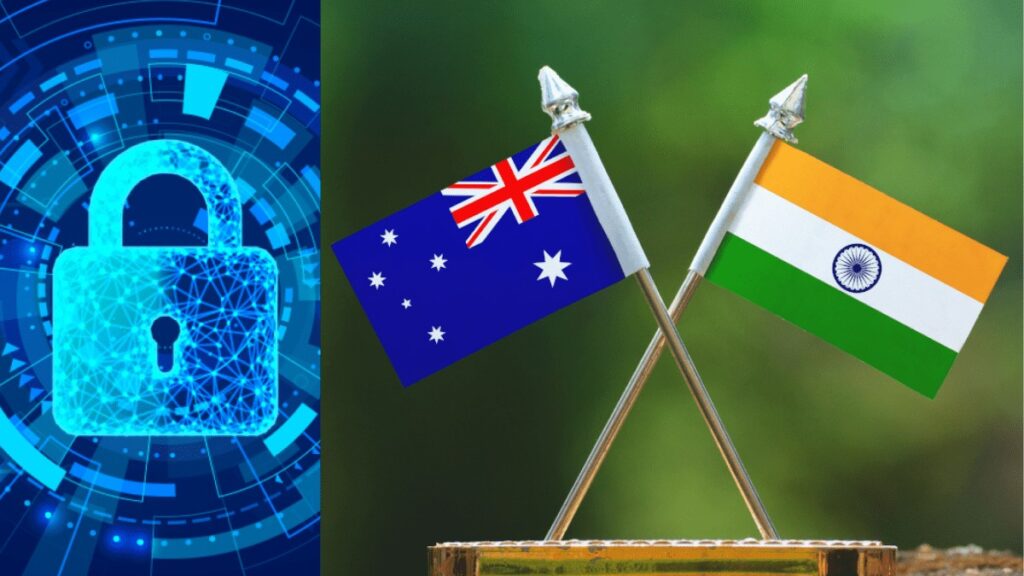Binita Verma
3rd July 2021

The first ever meeting between India and Australia on the critical issue of Cyber Security Cooperation on 10 June 2021, discussed the major upcoming policies and programs on cyber security between the two countries. Special Advisor, Cyber Affairs and Critical Technology at Department of Foreign Affairs and Trade of Australia, Rachel James and Paulomi Tripathi, Director (Oceania), Ministry of External Affairs of India attended the meeting
India and Australia have managed to overcome previous inhibitions about the cooperation on security sector and in recent times, the two countries have improved their strategic coordination very significantly and on maritime cooperation, due to the rise in China’s aggressive behavior and uncertainty about the United States’ role in the Indo-Pacific region. Geopolitics plays a major role in every bilateral relationship and in each country’s role in international affairs, and this is evidently reflected in the new direction of India-Australia relationship. During the period of 2006 -2014, the strategic dialogues between the two nations increased substantively leading to new policy dialogues, more exchanges on the defence sector, and rise in joint military exercises and moreover, an increased acknowledgement of new security cooperation domains like in the cyberspace. . The change of leaderships in both the countries, amidst the evolving dynamics in the Indo-Pacific region has led to new vistas in India-Australia cooperation. During the India-Australia meet on Cyber Police Dialogue on 2019, both the countries agreed to further enhance the practical cyber security policy cooperation through shared expert interactions on policy development, tele-communications, legislative developments and major engagements with the private sector too.
Both the countries agreed on broad base cooperation in spheres like the economy and cyber technologies at the first meeting of the India-Australia Joint Working Group (JMG) on the cyber security cooperation. The JMG is a mechanism established under a framework on the cyber-enabled critical technology cooperation between the two countries to implement a five-year long plan of action during 2020-2025, according to the Ministry of External Affairs (MEA). In this backdrop, both sides emphasized the need for exploring cooperation in multilateral formats as well.
Concerns have been mounting regarding the intentions and activities of the Chinese telecom giant, Huawei’s 5G networks, leading to the company’s services being banned in a number of countries. Countries like the UK, put a number of restrictions, in terms of regulating mobile service providers from buying any new kind of Huawei 5G equipment if any by the end of 2020 and removing of all the networks by 2027. This move was lauded by then Trump administration in the US and also urged other like-minded countries to similarly come forward. However, China opposed this decision of the UK and warned that it would take regulatory and mandatory steps to save the Chinese company. In other parts of Europe as well, this company faced many roadblocks, as a major amount of sales come from the European market and this included major countries like France, Germany and many other European countries, which were aiming at constraining the consumption of Huawei’s 5G kit by delivering partial term licenses.
Tara Cavanagh, Minister- Counsellor for Home Affairs, Australia, talking India-Australia cooperation, stated in August 2020, “We have a close and ongoing dialogue, through that we exchange a range of our experiences, including what we are doing on critical infrastructure and aspects, including our 5G network.” Other areas she referred relating to India-Australia cooperation, were exploring “regulatory space, including Australia’s encryption legislation, and how that could be used to prevent cyber-enabled crime” and “how to police the dark web.” In August 2018, Australia had to ban the Chinese companies from offering the 5G services, citing national security concerns. India in January 2020 allowed some of the Chinese firms to participate in 5G trials but later due to the border disputes in Ladakh, India banned some 59 Chinese apps citing national security concerns and later banned 47 more Chinese apps on June 2020.
There are some kinds of categories of threats that has been mentioned by India and Australia that they were looking upon very seriously, which includes financial gain, criminal groups, state based actors, terrorist groups, which might use the Internet to motivate, or exaggerate the emotions of the peoples and also to counter the terrorism including the violent extremism. Australia launched its Cyber Security Strategy 2020, which is focused to invest $1-67bn over the next 10 years to deal with cybercrime and protect the critical infrastructure systems of the country. There is no doubt that this cooperation in cyber security between New Delhi and Canberra will set out some basic principles on the practical actions to enhance more trade digitally, tie together opportunities on critical technology fields and address upcoming cyber security challenges.
India’s Ministry of External Affairs has also said that both sides will definitely look forward to the next bilateral cyber policy dialogue and an early convening of the inaugural JMG meeting on information and communication technologies, as India and Australia both shared the cyber security threat assessments as well as information on national and legislation cyber strategies. The new phase of relations between the two countries in the Indo Pacific region has been making a significant mark through its policy and planning, and the area of cyber security cooperation opens up a new domain of opportunities and challenges, based on which both sides can develop habits of cooperation. By tying together working relationship in this domain with countries like Japan and the United States, cyber security cooperation has the potential of becoming a critical area of mutual interest among the Quad countries.
*The author is currently pursuing Ph.D. in the US Studies Program, CCUSLAS, SIS, JNU and is an Associate Fellow at the Kalinga Institute of Indo-Pacific Studies.
Disclaimer: The views expressed in the article are those of the author
![]()

